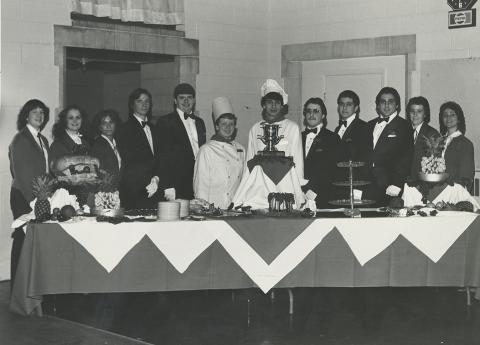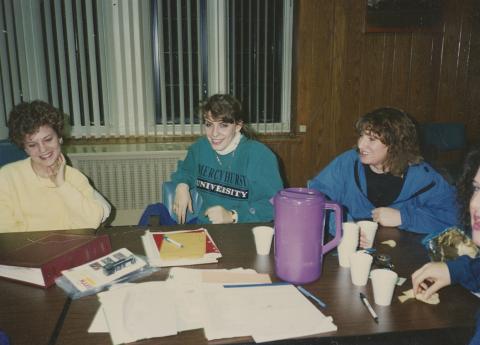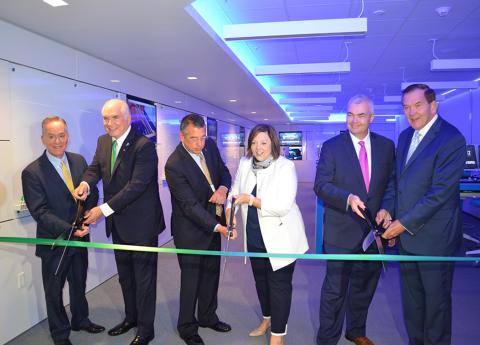History of Signature Programs
From its earliest days, Mercyhurst has been a trailblazing institution. This is evident in the boldness of its founding Sisters, the determination of its student body, the passion of its faculty, and the innovative nature of some of its most unique programs. Mercyhurst has always complemented its range of traditional liberal arts majors with programs that are undoubtedly unique. These signature programs set the Hurst apart, drawing eager students from across the nation and the world.
As a women’s college in the early and mid-twentieth century, Mercyhurst’s programs aligned with contemporary societal expectations for women. One of its first accredited bachelor’s degree programs was in home economics—a standard offering for a women’s college, but the Hurst’s program came with a twist. Students gained real-world experience in the science of homemaking by taking up residence for weeks at a time in the Home Management House, a house located on campus designated for use by home economics students to practice cooking, cleaning, and even childcare. For years, Mercyhurst would partner with a local orphanage to ‘adopt’ a baby for a short period of time so that the students could care for the child as if he or she were their own. Today, the concept seems surprising, but at the time, it made Mercyhurst’s home economics program uniquely suited to prepare students for their futures as homemakers.

Teaching was one of the most popular career paths for educated young women of this era, largely due to the gender expectations of the time. To meet the demand for new teachers to serve in Catholic grade schools in the region, Mercyhurst developed another unique offering—the Cadet Teacher Program. The program began in 1955, supplementing the more traditional path to a bachelor’s degree in elementary education. Participants received a scholarship to defray the cost and began their education at Mercyhurst in the summer term immediately following their graduation from high school. Two years later, they ventured into the community to spend the following two academic years teaching at a grade school of their choice, returning to Mercyhurst to continue their education during the summer terms. The program lasted over forty years, during which time it prepared approximately 450 new teachers for their careers. It ended in 1999 due to a decreased demand for teachers in Catholic grade schools and other changes in the education system.

In 1972, Mercyhurst developed a program that would prepare students to live out the Mercy value of compassionate hospitality in their careers. The Division of Hotel, Restaurant, and Institutional Management grew to become Mercyhurst’s largest academic major within a decade of its founding. Students gained hands-on experience working at the department's on- and off-campus dining establishments and learning in state-of-the-art kitchen facilities. The Marriott Corporation named the Mercyhurst program the best in the nation, cementing its prestige. Today, the Statler Department of Hospitality remains unique for its wide-ranging opportunities for experiential learning, including an annual student-run dining series and faculty-led study abroad trips.

The Hospitality department had the highest population of students for several years until it was eclipsed in size by the up-and-coming Intelligence Studies program. The program was created as a concentration within the history department in 1992 with the backing of Robert Heibel, former FBI deputy chief of counterterrorism, and was known as RIAP (Research/Intelligence Analyst Program). At its inception, it was the only such program in the United States. After the attacks of Sept. 11, 2001, it became clear that demand was growing for skilled intelligence professionals, and the program was growing to meet that demand. It became an independent major in 2004, at which point Mercyhurst began offering a master’s degree in Applied Intelligence. Students take coursework in foreign languages, computer science, history, and current world developments. The Intelligence Studies program affords its students a broad network of professional connections throughout the upper levels of government and business and provides countless internship and experiential learning opportunities.

Just as Mercyhurst developed its Intelligence Studies program to meet the need for professional analysts, the new bachelor’s and master’s degree programs in Cyber Security are structured to prepare professionals to address the most pressing problems of the twenty-first century: Cyber threats. Ransomware attacks, hacking, and data breaches threaten organizations at all levels of society – in government, healthcare, education, business, and more. Students of Mercyhurst’s Cyber Security program, which was established in 2018, learn hands-on cyber skills ranging from coding to digital forensics to hacking. The program is housed in the newly-equipped Federal Resources Corporation Cyber Education Center, a state-of-the-art facility. It is one of the only programs of its kind in the nation, and the option to pair a degree in Cyber Security with a second major in Intelligence Studies is unmatched.
Every program at Mercyhurst provides excellent opportunities to students, preparing them for successful careers. These signature programs, in particular, capture the ‘pioneer spirit’ that motivated the founding Sisters of Mercy in their efforts to establish a women’s college in Erie. The Cadet Teacher Program and home economics degree no longer exist in their original form. But their legacy lives in Mercyhurst’s commitment not only to adapt to changing times but to bring about positive change, blazing new paths and inspiring others near and far.